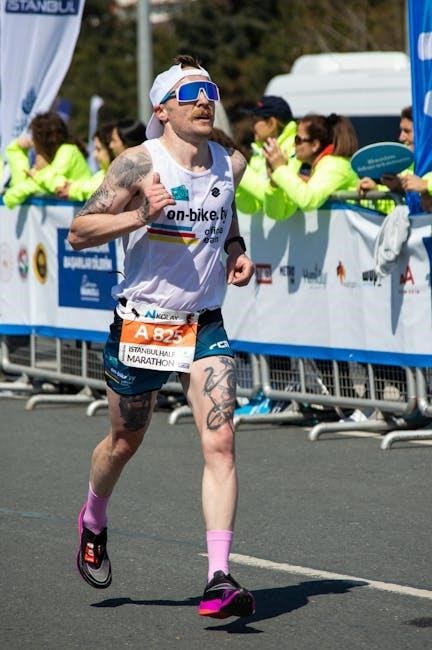
12 week half marathon training plan pdf intermediate
This 12-week plan is designed for intermediate runners seeking to improve their performance, focusing on endurance, speed, and recovery to ensure a strong, injury-free race preparation․
Overview of the Training Plan
This 12-week intermediate half marathon training plan is structured to gradually build endurance, speed, and stamina for runners with a solid foundation․ Designed for those who have completed at least a 10K, it balances four weekly training sessions with rest and recovery․ The plan emphasizes consistency, with dedicated speed workouts, cross-training, and progressive long runs, ensuring a well-rounded approach to improve performance and readiness for race day․
This plan is tailored for runners who have already completed a half marathon or regularly run 20-25 miles per week․ It assumes a solid running base, with the goal of improving performance and personal best times․ Ideal for those seeking structured progression, it balances intensity with recovery, making it suitable for experienced runners aiming to enhance their endurance and speed while preparing for their next half marathon challenge․
Key Components of the Plan
The plan includes 12 weeks of structured training with 4 sessions per week, combining speed workouts, cross-training, and progressive long runs․ It integrates heart rate zones for personalized pacing, builds endurance through gradual mileage increases, and incorporates recovery days․ The program also offers flexibility, allowing runners to adapt based on their experience and goals, ensuring a balanced approach to achieving peak race readiness while minimizing injury risks and preventing burnout․

Weekly Structure and Workouts
The plan features 4 weekly training sessions, blending speed workouts, cross-training, and rest days․ It progresses gradually, ensuring a balanced mix of intensity and recovery to avoid burnout․
General Weekly Breakdown
The plan includes four weekly training sessions, with rest or cross-training days․ Workouts are structured to balance intensity and recovery, ensuring gradual progression․ Each week typically features a mix of easy runs, speed sessions, and a long run, with flexibility to adapt based on individual progress and goals․ This balanced approach helps build endurance and speed while minimizing the risk of injury or burnout over the 12-week period․
Speed and Cross-Training Sessions
Speed sessions include interval training and tempo runs to enhance endurance and race pace․ Cross-training, such as cycling or swimming, is incorporated to improve cardiovascular fitness without overloading joints․ These workouts are balanced with rest days to ensure proper recovery, preventing overtraining and injuries․ The combination of speed and cross-training helps build muscular endurance and mental stamina, essential for optimal race performance․

Long Runs and Progression
The plan includes weekly long runs, progressively increasing from 3 to 10 miles over 12 weeks․ These runs build endurance and mental stamina, crucial for race day․ The final weeks incorporate a taper to allow recovery before the half marathon․ This structured progression ensures runners adapt safely, avoiding injury while building confidence and physical readiness for the 13․1-mile event․
Nutrition and Hydration Strategies
A balanced diet with complex carbs, lean proteins, and healthy fats fuels performance․ Proper hydration, including electrolytes, is essential for optimal endurance and recovery during training․
Pre- and Post-Workout Nutrition
Pre-workout meals should include complex carbs and lean proteins 2-3 hours before running to fuel energy levels․ Post-workout, prioritize protein-rich foods and electrolytes within 30-60 minutes for recovery․ Stay hydrated with water or sports drinks, especially during long runs․ Avoid heavy meals before workouts to prevent discomfort․ Balanced nutrition supports endurance, recovery, and overall performance throughout the 12-week training plan․
Hydration Tips for Optimal Performance
Proper hydration is essential for peak performance and recovery․ Drink water regularly throughout the day, aiming for 8-10 glasses․ Monitor urine color to ensure it’s pale yellow, indicating adequate hydration; During long runs, consider sports drinks to replenish electrolytes․ Avoid overhydration and adjust intake based on weather conditions․ Staying consistently hydrated supports energy levels, prevents cramps, and enhances overall training efficiency throughout the 12-week plan․
Mental Preparation and Race Strategy
Build mental resilience through visualization, positive affirmations, and goal setting․ Stay focused, adapt to challenges, and maintain confidence to optimize performance and achieve your race objectives effectively․
Building Mental Endurance
Mental endurance is crucial for tackling the demands of a half marathon․ Practice visualization techniques, such as imagining race-day success, to boost confidence․ Incorporate positive affirmations to stay motivated during tough workouts․ Learning to manage race-day nerves and adapt to challenges ensures resilience․ Consistency in training and trusting the process fosters a strong mental foundation, enabling you to push through fatigue and maintain focus during the race․
Understanding Pace and Goal Setting
Setting realistic goals is essential for a successful half marathon․ Start by defining your target finish time, based on current fitness levels․ Incorporate pace-specific workouts to build speed and endurance․ Use heart rate zones to monitor effort and stay consistent․ Track progress weekly to adjust training intensity․ By understanding your pace and setting achievable milestones, you’ll stay motivated and prepared to reach your best performance on race day․
Essential Gear and Attire
Invest in supportive running shoes, moisture-wicking apparel, and breathable socks for comfort․ Consider a hydration belt or vest for long runs, and wear reflective gear for visibility during early morning or evening training sessions․
Running Shoes and Apparel

Choose supportive, well-fitted running shoes with adequate cushioning for your foot type․ Opt for moisture-wicking, breathable apparel to keep you dry and comfortable during workouts․ Consider reflective gear for visibility during early morning or evening runs․ Proper fit and material selection can significantly enhance performance and reduce discomfort, ensuring a more enjoyable training experience throughout the 12-week program․
Additional Gear for Training
Invest in a heart rate monitor or fitness tracker to track progress and stay within target zones․ A hydration belt or water bottle is essential for long runs, ensuring proper hydration․ Reflective gear enhances visibility during early morning or evening sessions․ Anti-chafing products and sweat-resistant accessories can prevent discomfort․ These tools enhance training efficiency, support performance, and contribute to a safer, more enjoyable experience throughout the 12-week program․

Rest and Recovery
Rest and recovery are crucial for muscle repair and performance enhancement, ensuring the body adapts to training demands and progresses effectively throughout the 12-week plan․
Importance of Rest Days
Rest days are vital for muscle recovery, injury prevention, and overall performance improvement․ They allow the body to repair and adapt, making them a cornerstone of the training plan․ Incorporating rest ensures sustained progress and prevents burnout, aligning with the structured approach of the 12-week program․ Active recovery, such as light cross-training or stretching, can be included on rest days to maintain mobility without overexertion․ Proper rest is key to achieving peak race readiness․
Recovery Techniques for Runners
Effective recovery techniques include foam rolling, ice baths, and stretching to reduce muscle soreness․ Incorporating yoga or swimming as low-impact activities aids in active recovery․ Prioritizing hydration and nutrition replenishes energy stores and supports muscle repair․ Adequate sleep is also crucial for overall recovery and performance․ These methods ensure runners maintain consistency and progress throughout the 12-week plan, keeping them injury-free and race-ready․

Preparing for Race Day
Tapering two weeks before race day allows your body to rest․ Familiarize yourself with the course to strategize pacing and fueling․ Mental preparation and visualization enhance performance․
Understanding the Race Course
Understanding the race course is crucial for a successful half marathon․ Familiarize yourself with the layout, elevation changes, and key landmarks․ Knowing where aid stations and spectator support will be can boost your confidence․ Visualize the route to prepare mentally․ A well-understood course helps you strategize pacing and fueling effectively, ensuring you’re ready for race day challenges․
Tapering Strategy Before the Race
The final 10 days before the race focus on reducing weekly mileage to allow your body to recover and adapt․ This strategic decrease in training intensity ensures you arrive at the start line fresh and ready․ Incorporate rest days, easy runs, and light cross-training to maintain fitness without overexertion․ Tapering helps prevent injury and maximizes performance, making it a critical phase of the training plan․
Target Audience: Intermediate Runners
This 12-week intermediate half marathon training plan is specifically designed for runners who have already completed a 10K or similar distance, offering a balanced approach to enhance endurance, speed, and overall performance without overtraining․
Final Tips for Success
Stay consistent with your training, listen to your body, and prioritize recovery to avoid injuries․ Incorporate proper nutrition and hydration strategies to fuel your runs․ Mental preparation is key—visualize your success and maintain a positive mindset․ Trust the plan, stay disciplined, and celebrate small victories along the way․ With dedication and focus, you’ll be ready to crush your half marathon goal in 12 weeks․
Staying Motivated Throughout the Plan
Stay motivated by setting realistic goals and celebrating small victories․ Track your progress weekly to see improvements․ Surround yourself with supportive runners or join a running group for accountability․ Mix up your workouts to avoid boredom and stay engaged․ Remind yourself why you started, and visualize crossing the finish line․ Consistency is key, so stay committed and embrace the journey—every step brings you closer to your half marathon success․
Related Posts

acls exam version c answers pdf
Get ACLS Exam Version C answers in PDF format. Free study guide, practice questions, and instant download. Prepare smarter, not harder!

explaining adhd to a child pdf
Learn how to explain ADHD to children in a simple, engaging way. Download our free PDF guide to help kids understand and manage their ADHD.

john paul jackson books pdf free download
Access John Paul Jackson’s books for free in PDF. Instantly download his spiritual teachings and revelations.